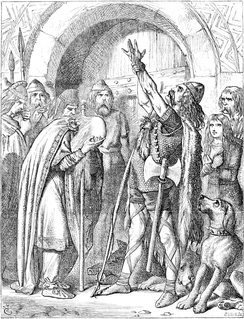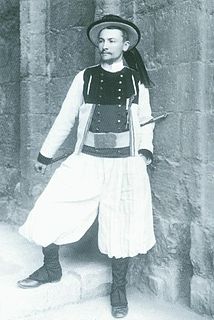Gwenc'hlan is the cognomen of a legendary 6th century Breton druid and bard called Kian, the subject and purported author of a Breton song called "Diougan Gwenc'hlan", published by Hersart de la Villemarqué in his 1839 anthology Barzaz Breiz.

A gorsedd is a community or meeting of modern-day bards. The word is of Welsh origin, meaning "throne". It is often spelled gorsedh in Cornwall and goursez in Brittany, reflecting the spellings in the Cornish and Breton languages, respectively.

Barzaz Breiz is a collection of Breton popular songs collected by Théodore Hersart de la Villemarqué and published in 1839. It was compiled from oral tradition and preserves traditional folk tales, legends and music. Hersart de la Villemarqué grew up in the manor of Plessix in Nizon, near Pont-Aven, and was half Breton himself.

Breton literature may refer to literature in the Breton language (Brezhoneg) or the broader literary tradition of Brittany in the three other main languages of the area, namely, Latin, Gallo and French – all of which have had strong mutual linguistic and cultural influences.

Loïc Gwenc'hlan Le Scouëzec was a Breton writer and Grand Druid of Brittany.

Bleimor, more fully Urz Skaouted Bleimor, was a Breton Scouting organization, taken from the pseudonym used by Breton poet Jean-Pierre Calloc'h, who died during World War I.
The Breton regionalist union was a Breton cultural and political organisation created August 16, 1898. It was a broadly conservative grouping dedicated to preserving Breton cultural identity and regional independence. It expressed the ideology of mainly middle-class and aristocratic groups to secure continuity in local administration and Breton culture.

Morvan Marchal, is the Breton name of Maurice Marchal, an architect and a militant Breton nationalist. He is best known for having designed the national flag of Brittany.

Kredenn Geltiek is a neo-Pagan Druidic group founded in Brittany in 1936. It was later known as Kredenn Geltiek Hollvedel. It now exists under the name Kevanvod Tud Donn. It publishes the journal Ialon-Kad-Nemeton.

Erwan Berthou was a French and Breton language poet, writer and neo-Druidic bard. His name is also spelled Erwan Bertou and Yves Berthou. He also used the bardic pseudonyms Kaledvoulc'h, Alc'houeder Treger and Erwanig.

François-Joseph-Claude Jaffrennou was a Breton language writer and editor. He was a Breton nationalist and a neo-druid bard. He is also known as François Taldir-Jaffrennou, since he also used the Druidic name Taldir. He was one of the pioneers of the Breton autonomist movement.

Charles Jules-Joseph de Gaulle was a French writer who was a pioneer of Pan-Celticism and the bardic revival. He is also known as Charlez Vro-C'hall, the Breton language version of his name. He was the uncle of the army officer and statesman Charles de Gaulle.
Per Vari Kerloc'h is the current Grand Druid of the Goursez Breizh. He was born at Douarnenez, in the western part of Brittany. The Grand Druid is appointed for life, whereas the Welsh and Cornish equivalents are now elected every three years. Kerloc'h has been a middle manager and trade union representative with La Poste. He is a native Breton speaker and a fluent speaker of Cornish. His bardic name is Morgan.
Jean Le Fustec was a Breton bard, and the first Archdruid of the Goursez Vreizh. He is also known by his Breton language name Yann ab Gwilherm and his Druidic name Lemenik.

Jean François Marie Le Gonidec de Kerdaniel was a Breton grammarian who codified the Breton language.

Maurice Le Scouëzec, was born in Mans on 1 October 1881 and died at Douarnenez on the 1 May 1940. He was a French artist, engraver, illustrator and writer.
Morvarc'h is the name of a fabulous horse of Breton legend found in two folktales reworked in the 19th and 20th centuries. Though its name appears in older sources, it was invented or reinterpreted by Charles Guyot, who named it Morvark in his version of the legend of the city of Ys in 1926. It belongs to the "Queen of the North" Malgven, who gives it to her husband King Gradlon. Endowed with the ability to gallop on the waves, Morvarc'h is described as having a black coat and as breathing flames through its nostrils. It also appears in a Breton folktale about King Marc'h of Cornouaille. In the course of a deer hunt it is killed by its own rider's arrow, which has been turned around by the spell of Dahud, the daughter of Malgven. She then puts the ears of the horse Morvarc'h on the head of King Marc'h, who seeks in vain to hide them.

Gorsedd Cymru, or simply the Gorsedd, is a society of Welsh-language poets, writers, musicians and others who have contributed to the Welsh language and to public life in Wales. Its aim is to honour such individuals and help develop and promote their fields in addition to maintaining relationships with other Celtic nations and Y Wladfa. The Gorsedd is most prominent at the National Eisteddfod of Wales where it is responsible for the main ceremonies held.

"Ar rannoù", also known as "Gousperoù ar raned", is a traditional Breton folksong, composed in twelve parts or "series".

















